|
|
|
Sort Order |
|
|
|
Items / Page
|
|
|
|
|
|
|
| Srl | Item |
| 1 |
ID:
152738
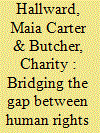

|
|
|
|
|
| Summary/Abstract |
While the concepts of human rights and peace are increasingly linked in the study and practice of International Relations, there is great variance and inconsistency in how the concept of peace is discussed in the study and practice of human rights. We conduct an examination of the websites of human rights nongovernmental organizations (NGOs) affiliated with the United Nations Human Rights Council in Geneva, Switzerland, to explore whether and how human rights and peace are linked. Religiously-affiliated and women’s NGOs typically link these concepts, while non-Western NGOs stress peace over human rights.
|
|
|
|
|
|
|
|
|
|
|
|
|
|
|
|
| 2 |
ID:
160804
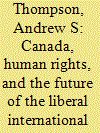

|
|
|
|
|
| Summary/Abstract |
Human rights—specifically international human rights law—have been central to the success of the liberal international order. But since the founding of the United Nations (UN), Canada has had a complicated relationship with international human rights law. This article provides a survey of sixty years of Canadian human rights diplomacy at the UN Commission on Human Rights, from its establishment in 1946 to its dissolution in 2006. During this period, there were moments when Canada did champion new international law, and did so courageously. Yet there were others, such as during negotiations to recognize and codify the rights of Indigenous peoples, when it stood in the way of progress. But the international order that has served Canada so well since the end of the Second World War is under threat, due to a combination of shifts in the global balance of power, and critical challenges such as climate change. If it is to survive into the twenty-first century, advanced democracies such as Canada will need to lead in the development and enforcement of international human rights law, a role that governments in Ottawa have at various times been reluctant to play.
|
|
|
|
|
|
|
|
|
|
|
|
|
|
|
|
| 3 |
ID:
163919
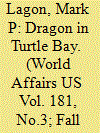

|
|
|
|
|
| Summary/Abstract |
China’s role in the United Nations (UN) is steadily rising at a time the United States is seeking burden-sharing and rethinking its multilateral leadership role. This article highlights that China’s increasing role in three critical areas—(1) UN peacekeeping; (2) the work of the UN on human rights, particularly in the Human Rights Council; and (3) the governance of the digital realm and Internet freedom—has significant implications for U.S. interests and broader global governance efforts. Although China’s transformation into a responsible stakeholder in various areas of the UN’s work could be promising, Beijing’s attempts to alter existing liberal norms bear close examination. Those seeking a larger Chinese role in the UN might best be careful what they wish for. Despite the emergence of populism and some skepticism of multilateral arrangements in their domestic politics, the United States and like-minded nations have an interest in reinforcing liberal norms in these three areas of global governance and beyond.
|
|
|
|
|
|
|
|
|
|
|
|
|
|
|
|
| 4 |
ID:
077851


|
|
|
| 5 |
ID:
124931
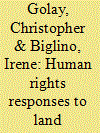

|
|
|
|
|
| Publication |
2013.
|
| Summary/Abstract |
This article approaches the debate on 'contemporary land grabbing' from a human rights perspective, focusing on one right that is particularly threatened: the right to food. It sketches an analytical framework grounded in international human rights law and the contribution such a framework can bring to the land-grabbing debate. Following a brief historical background on the right to food and its articulation in international human rights law, the paper expands on this by focusing on what can be called human rights responses to land grabbing from a right to food standpoint. The analysis considers the contributions of different actors in the human rights sphere and examines the role of the UN Committee on World Food Security and its recently adopted Voluntary Guidelines on the responsible governance of tenure of land, fisheries and forests. It also investigates how the phenomenon has been addressed by the UN human rights mechanisms, drawing on relevant practice of the UN treaty bodies and the Human Rights Council, with a focus on the Special Rapporteur on the right to food and the Special Rapporteur on the human rights situation in Cambodia. The engagement of regional human rights system with the issue of large-scale land transactions is also analysed.
|
|
|
|
|
|
|
|
|
|
|
|
|
|
|
|
| 6 |
ID:
074274


|
|
|
| 7 |
ID:
138764


|
|
|
|
|
| Summary/Abstract |
This article attempts to demonstrate the importance of the discursive context for whether and, if so, how the European Union (EU) can exert normative power in different policy areas. Surprisingly, the concept of power has not been extensively discussed in the academic literature on Normative Power Europe, with the notable exceptions of Diez (2013); Keene (2012); Forsberg (2011) and Huelss (2011) (who also discuss the meaning of the ‘normative’). Focusing on power, the question asked in this article is how the discursive context of the politics of religion affects the EU’s ability to exert normative power in this area. The article examines the politics of religion by looking at the case of the debate about human rights versus religion in the United Nations Human Rights Council after the year 2000. The broader point addressed in the article is whether the EU can exert normative power regardless of the discursive context of the policy area concerned.
|
|
|
|
|
|
|
|
|
|
|
|
|
|
|
|
| 8 |
ID:
151997
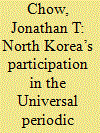

|
|
|
|
|
| Summary/Abstract |
North Korea’s participation in the UNHRC’s Universal Periodic Review (UPR)—a peer review in which states make recommendations to one another for improving human rights implementation—is a notable exception to its rejection of other human rights mechanisms. What explains North Korea’s willing participation in the UPR? This essay analyses North Korea’s participation in the first (2008–11) and second (2012–15) UPR cycles through its written submissions, responses to recommendations, and recommendations to other states. It finds that North Korea has consistently accepted weak recommendations, rejected more specific policy changes, and implemented accepted recommendations on a limited basis, allowing it to claim compliance with human rights at minimal cost. The UPR’s reliance on states’ self-reports and its inability to adjudicate competing factual claims allow North Korea to reject claims of egregious abuses, openly advocate for a radically state-centric vision of human rights, and challenge the legitimacy of human rights mechanisms like the Commission of Inquiry and Special Rapporteur while building support from other states with similar views. Notably, the Commission of Inquiry appears to have motivated North Korea to increase its cooperation with the UPR, demonstrating that the UPR complements but cannot replace other UN human rights mechanisms.
|
|
|
|
|
|
|
|
|
|
|
|
|
|
|
|
| 9 |
ID:
102781
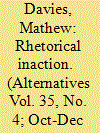

|
|
|
| 10 |
ID:
193254
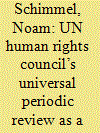

|
|
|
|
|
| Summary/Abstract |
Applying the case study of Saudi Arabia, this article examines the rhetoric of nations who are well documented as being severe violators of human rights and the use they make of the UN Human Rights Council Universal Periodic Review (UPR) mechanism to defend, downplay, and deny their human rights violations. Authoritarian countries who violate human rights systemically, severely, and intentionally as a matter of government policy apply different rhetorical strategies when undergoing the UPR process and writing and submitting their respective national reports for the UPR process. This article analyzes these strategies, illustrates how different countries use them during the UPR process, and explores the value and limitations of the UPR process and its efficacy at advancing human rights.
|
|
|
|
|
|
|
|
|
|
|
|
|
|
|
|
|
|
|
|
|